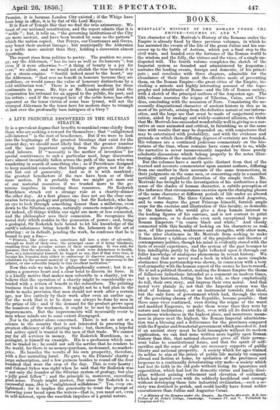• A LIVE PRINCIPLE DISCOVERED IN TIM SILURIAN STRATUM.
IT is a prevalent dogma that benefits to mankind come chiefly from those who are seeking a reward for themselves ; that " enlightened self-interest " is the root of beneficence. But if we were to look into the beginnings of the greatest blessings that exist for •the present day, we should most likely find that the greater number and the most important sprang from the purest disinter- ested labours. If "necessity is the mother of invention" for special contrivances to suit a particular need, large discoveries have almost invariably fallen across the path of the man who was wandering in search of something else ; as if Providence designed to keep mankind conscious that blessingsare given not for de- sert but out of generosity. And so it is with mankind ; the greatest benefactors of the race have been so of their mere motion. It is probable that we might get more out of our material resources if we trusted more to the ge- nerous impulses in treating those resources. Sir Roderick Murchison struck out a strange rule at a charity-dinner the other day. At a first glance one does not see the close con- nexion between geology and printing ; but Sir Roderick, who has an eye to look through something denser than a millstone, even down-to the Silurian system, naturally connects remote objects,— for indeed, all things within our sight are more or less connected, and the philosopher sees their connexion. He recognizes the moral duty which resides in the possession of power ; and, being a geologist, Sir Roderick feels bound to let his knowledge• of the earth's substances bring benefit to the labourers in the art of printing ; or in default, pending the work, he confesses that he is bound to pay a fine—. " Printers like other men, sometimes fall into a state of adversity, through no fault of their own ; the principal cause of it being blindness, resulting from the peculiar nature of their occupation. It -was said, for instance, that the minerals in which he dealt were deleterious to health. Now, as a mineralogist himself, he begged to say, that if that were true, it became his bounden duty either to endeavour to discover something as a substitute for the present material of type that would be innocuous to.the printer, or else subscribe largely to this excellent-institution."
Now this rule we take to be philosophically correct ; but it re- quires a generous heart and a clear head to discern -its force. It is a kindly motive that makes men subscribe to a charity, yet we believe that the operation of a charity might be considerably ex- tended-with a return of benefit to the subscribers. The printing business itself is an instance. It might not be a bad plan in -the trade to make provision that men should not work _after a certain age, nor live entirely by their work after even an earlier age. For. the work that is to be done can always be done by men in the prime of life ; and if the demand for the product grows upon the numbers of the workmen, it ought to be met by mechanical improvements. But the improvements will necessarily occur to men whose minds are to some extent disengaged.
Nor is the printer alone concerned. There is not an art or a science in the country that is not interested in procuring the greatest efficiency of the printing trade ; but, therefore, a hopeful i and active spirit is wanted in the men of that.trade. 1We cannot pay for all services in money. Sir Roderick Murchison, as a geologist, is himself an example. His is a profession which can- not be traded in ; he could not sell the service that _he renders to. the world, for there is no money-purchase, no demand, no market- price. He handles the results of his own prosperity, therefore, with a free untrading hand. He gave to the Printers' charity a large -subscription, and a few guineas besides to round off the four hundred that were the crop of the day. This is very hearty ; and. Colonel Sykes was right when he said that Sir Roderick was. " not only the founder of the Silurian system of geology, butaLso a jolly good fellow " ; and the principle Ls moreover, exceeding good sense. People might answer, But since. Sir Roderick is a successful man, this is "enlightened selfishness." Yes, very en- lightened ; for it implies the generosity to trust the precept .of throwing your bread upon the waters—that is, you must act, even- in self-interest, upon the unselfish impulses.of a genial nature.


























 Previous page
Previous page